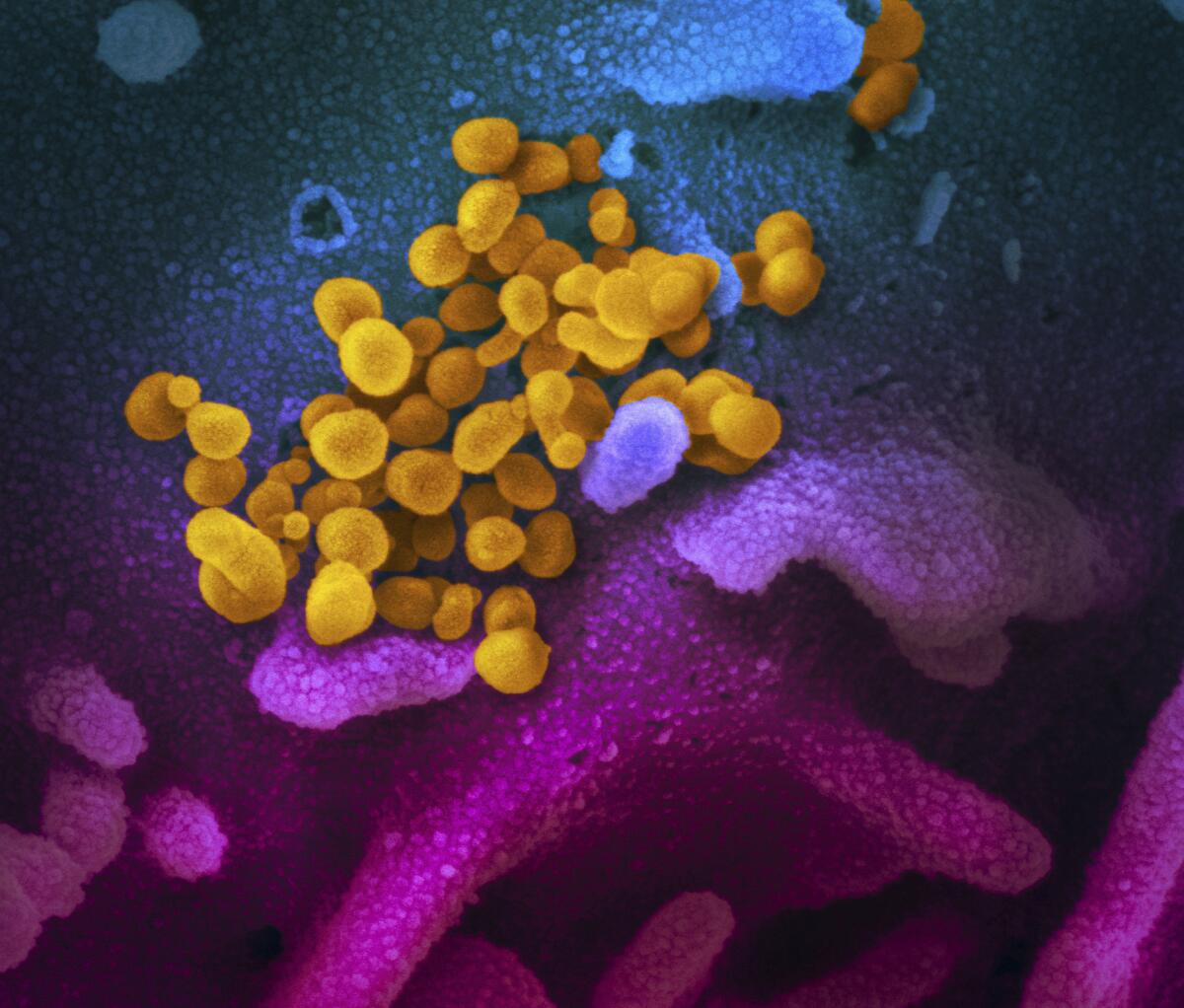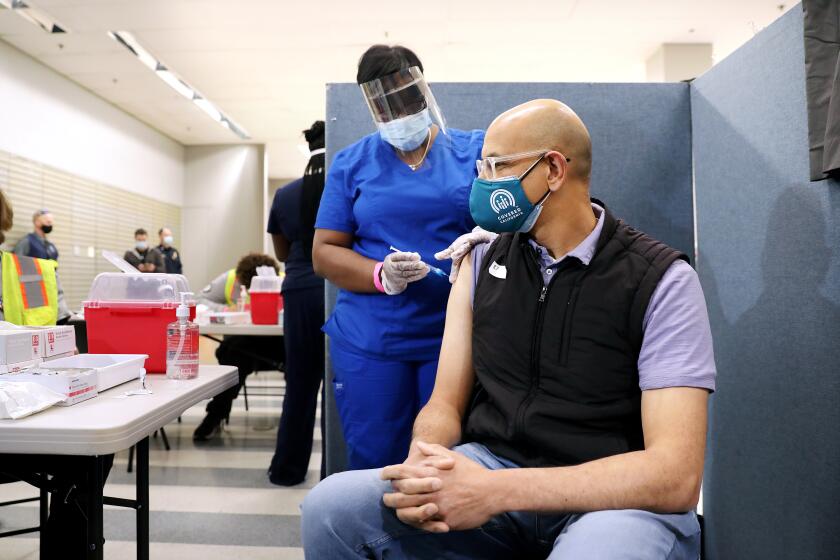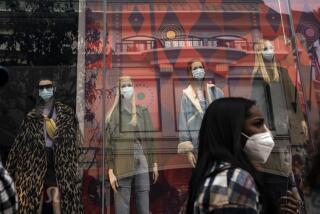COVID-19 and lasting erectile dysfunction: Here’s what we know

- Share via
Can COVID-19 cause lasting erectile dysfunction?
This is now the topic of some discussion among doctors and health experts as they try to better understand the effects of the coronavirus. The problem has been observed in some patients, but experts agree more study is needed to form any conclusions.
Some men are coming into doctors’ offices saying erectile dysfunction has occurred following a COVID-19 infection, said Dr. Ryan Berglund, a urologist at the Cleveland Clinic. At the moment, there’s primarily anecdotal evidence, and “we don’t know the scale of the problem at this point.”
Berglund stressed that it had not been proved that COVID-19 causes erectile dysfunction.
Observational studies need to be done, he said, adding that a helpful one would be to study men in the same age group with similar health status to see if rates of erectile dysfunction differ depending on whether they have the coronavirus.
“That, we haven’t gotten to yet,” Berglund said.
It would not be surprising if COVID-19 harmed male sexual health, said Dr. Emmanuele Jannini, professor of endocrinology and medical sexology at the University of Rome Tor Vergata, who has written extensively on the subject.
Erectile dysfunction could be a symptom of “long COVID,” he said, an array of symptoms that can last months after the initial coronavirus infection. Common symptoms of long COVID include difficulty breathing, chest pain, heart palpitations and loss of smell or taste.
Jannini said he suspected the risk was higher in patients who suffered from pneumonia accompanying COVID-19, which triggers inflammation of the blood vessels — specifically, endothelial cells that line the body’s blood vessels.
Should people who got the Johnson & Johnson COVID-19 vaccine consider getting a booster shot of Pfizer-BioNTech or Moderna?
When those blood vessels and the rest of the cardiovascular system are harmed, it can trigger erectile dysfunction, Jannini said. He suspects that when a coronavirus infection leads to erectile dysfunction, it can last long after the initial bout with COVID-19 has passed.
Unlike some other mammals that have a bone in their penis that contributes to an erection, erections in humans are solely generated through blood flow, Berglund said — specifically, a dilation of arteries that brings more blood flow to the penis than can exit it. “So anything that could affect the ability of the artery to effectively deliver sufficient blood supply to create an erection could lead to erectile dysfunction,” he said.
In much the same way inflammation of the heart muscle, or myocarditis, can occur as a consequence of COVID-19, it is plausible that erectile dysfunction could occur from the disease.
“It’s also the blood vessels themselves that can become inflamed,” Berglund said, “which could cause an obstructive phenomenon and negatively impact the ability to get erections.”
Lasting erectile dysfunction associated with COVID-19 has consequences beyond sexual activity. It can be an indicator of related disease of the heart and blood vessels, he said, and those suffering from it should tell a doctor and get a regular heart checkup.
“The most concerning thing here would be that erectile dysfunction related to the disease may be an indicator of other underlying vascular disease related to COVID,” Berglund said. Vascular disease refers to coronary artery disease, which can lead to a myocardial infarction, commonly referred to as a heart attack, he added.
Here, in short, are several of the reasons COVID-19 could contribute to persisting erectile dysfunction or otherwise impair male sexual health:
Pneumonia from COVID-19 causes blood vessels to become inflamed
Pneumonia from COVID-19 can cause blood vessels to become inflamed, leading to restricted blood flow, which can contribute to erectile dysfunction, Jannini said.
“Very often,” said Berglund, “the development of erectile dysfunction is related to the development of vascular disease.”
And it’s now becoming clear that some patients with COVID-19 are suffering from inflamed blood vessels, he added.
“This is not an uncommon problem with other viral infections,” Berglund said. “It’s just that the scale of this viral infection and the severity of it have probably led to a higher incidence of vascular-related disease and vascular inflammatory disease than other viral infections.”
With kids under 12 still ineligible for the COVID-19 vaccine, how worried should parents be about the Delta variant?
Pneumonia caused by COVID-19 harms blood oxygen levels
Pneumonia can lead to lung damage that can reduce a person’s ability to get enough oxygen in the blood, Jannini said. That can reduce the ability to maintain an erection.
It’s well established that a lack of sufficient oxygen in the blood can lead to erectile dysfunction, he said.
COVID-19 may damage the cells that produce testosterone
It’s possible the coronavirus infects cells in the testicles, including Leydig cells that produce testosterone, the male sex hormone, which affects libido and desire.
A review of scientific literature on possible ways erectile dysfunction can develop in COVID-19 survivors, which Jannini coauthored, says Leydig cells also have a protein called ACE2 — the same protein the coronavirus uses to begin infecting human cells. Autopsies of people who have died from COVID-19 show “significantly reduced Leydig cells,” the review said.
Berglund called this hypothesis reasonable, but it hasn’t been proved.
Lacking a sense of smell may affect arousal
An inability to pick up scents can reduce the ability to become aroused, Jannini said.
Depression and anxiety from the pandemic may contribute
The effects of the pandemic, including losing jobs and the impact of stay-at-home orders, can also affect people’s moods and contribute to erectile dysfunction, Jannini said.
“There is a strong, emotional, psychological component,” Berglund said, “to being able to get an erection — quote-unquote ‘being in the mood.’”
Berglund said he had patients he knew could get an erection because they would wake up with one. “But when the time comes to be intimate, they can’t actually get an erection.
“And we know that the disease has caused a tremendous amount of stress on people,” he said, “and that can affect your ability to get erections.”
More study is needed
When people get an illness, they tend to blame the illness for things that happen, Berglund said, even if the illness isn’t the cause of the problem.
But the plausible relationship between COVID-19 and erectile dysfunction is one more reason for the unvaccinated to get their shots, Jannini said.
“Having vaccinations leads to having more sex,” he quipped. “I would suggest for young people to get their vaccinations: If they want to have sex, better to get the vaccine.”
More to Read
Sign up for Essential California
The most important California stories and recommendations in your inbox every morning.
You may occasionally receive promotional content from the Los Angeles Times.













